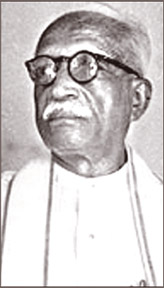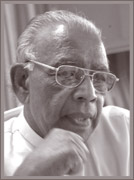Free Education proposals and tuition
Text of the Dr C W W Kannangara Memorial
Lecture - 22 by Prof. A. V. Suraweera held at National Institute of
Education, Maharagama on
October 13, 2011
Much has been said about Dr Kannangara, the education visionary and
social reformer who was instrumental in bringing about equality of
opportunity through revolutionary changes in our education system. As
chairman of the Executive Committee on Education and Minister in the
State Council from 1931 to 1947, Christopher William Wijekoon Kannangara
was responsible for paving the path towards a ‘knowledge society’ at a
time when such terminology was not even within use in the vocabulary.
 |
|
Dr. C W W
Kannangara |
By way of a preamble to this talk, I wish to record two of my
personal experiences, not unrelated to our topic. One was the official
inauguration of the Minuwangoda Central School in 1944 where my father
and I had the fortune of participating with my sister who was admitted
as one of the scholarship holders. Having passed the scholarship
examination from my village school, a Buddhist assisted school situated
adjoining our home, she was admitted to Year Six of the Minuwangoda
Central with free board and lodging, in addition to a monthly allowance
of Rs 20.
I still remember the inspiring address given by the chief guest Dr C
W W Kannangara, the Minister of Education who talked of his education
reforms including the free education scheme and the Central Schools
project, his own creation. Incidentally my sister continued her studies
at Minuwangoda to enter the University (Peradeniya) with all facilities
as a scholarship holder.
The following year, 1945 October, free education was introduced and
my family was relieved of another burden of paying my school fees of Rs
7.50 monthly in the SSC class at the Government English School, Gampaha.
Next year after a supplementary entrance test I had the fortunate of
getting selected to Royal College, Colombo, thanks to free education. I
must proudly mention that we were a low-income village family with five
brothers and two sisters now all doing well in life having benefited
from free education.
Going through the list of ‘distinguished educationists’ who have so
far delivered the Kannangara Memorial Lectures, I must record that it is
with profound humility that I perform this honourary task. By way of
overcoming this dilemma, I am tempted to select a topic within my scope
while at the same time do justice to the great man. My experience as a
Senior Professor and training in literary and socio-cultural fields give
me confidence in analyzing a given text placed in a given context and
make meaningful observations. It is in this background that I have
decided on a rather uninspiring topic, namely, ‘Dr Kannangara’s Free
Education Proposals in relation to the subsequent expansion of the
Tuition Industry.”
I take this opportunity to express my sincere gratitude to my good
friend Professor Abeyaratne Banda, Director General, NIE and its staff
of Research, Planning and Development Division for giving me this unique
opportunity to deliver the Dr C W W Kannangara Memorial Lecture 2011.
My presentation will consist of two parts. In part one, I propose to
analyze the relevant sections dealing with the Free Education proposals
as enunciated in the Report of the Special Committee on Education,
Sessional paper XXIV – 1943, the architect of which was obviously Dr
Kannangara himself. Part two will deal with the tuition industry which
has now developed into a challenge to the present formal education
system. It is interesting to note that Kannangara himself had expressed
his thoughts on this subject.
Personal experiences
I do not propose to give a biographical sketch of Dr Kannangara as
most previous lecturers had done, except to record certain experiences
in his life that would have influenced his entire outlook. The first was
a bitter experience from Richmond.
“I speak from bitter experience. I was selected as a scholar of
Richmond College, after a competitive examination. I came out first in
the exam and I won this scholarship. In my college there were three
classes of boarders. In one the charge was Rs 25 and this class was
composed of the sons of the very rich.
As an ‘upper class’ they dined with the teachers. In the second class
the charge was Rs 15. Those who dined with the teachers were given two
courses while those who paid Rs 15 received only one course. I was put
amongst those who paid Rs 10, the lowest class. I saw these other
children receiving better food and better treatment, and yet to this day
the fact that I received free education at this College is flung in my
face. I certainly did receive free education, but this ‘stigma’ has
stuck for life.”
On another occasion he had poured out his feelings thus:
“What do X and Y know of poverty as I know it? To sleep on a mat on a
bare floor and have only rice and sambol to eat. I must see that village
boys get a better chance in life than I had.”
What an unassuming personality Kannangara was, a Minister of the
State Council at that, to be so modest as to make such a genuine
statement!
 |
|
Prof. A. V. Suraweera |
Kannangara’s family background, the painful experiences he had as a
child and more so, the juxtaposed socio-religious situations he faced in
school and outside, certainly, would have convinced him that a
revolutionary reformist attitude in education was the need of the day in
order to bring about a national revival for the creation of a united Sri
Lanka where human justice prevailed.
Recognition of services
While discussions on proposals on free education and those pertaining
to secondary education were going on, Kannangara’s attention was drawn
towards the creation of the University as well. Among other problems,
‘battle of sites’ was prominent. Whether the university was to be sited
around Kandy or Colombo had been a topic of argument. Though Kannangara
favoured Colombo, with his modest outlook, he had bowed to the majority
opinion and finally agreed on Peradeniya. Things had moved fast after
Ivor Jennings had assumed duties as Principal of the University College.
And finally as Minister of Education with all his tact and diplomacy, he
was able to get the bill passed establishing the University of Ceylon
which came into operation on July 1, 1942. This was at a time when the
country was undergoing a period of acute economic depression resulting
from the World War II.
At the very first convocation of the University, held on October 14,
1942, Kannangara was conferred the Honorary Degree of LLD. Since then
this unassuming man came to be called Dr C W W Kannangara. At that time
there was only one University and no other for him to be conferred
further honours.
However, after the establishment of the Vidyodaya (now Sri
Jayewardenepura University), he was conferred with another Honorary
Degree, this time a D.Litt in 1961. That was not all. It is said that
the honorary title of Shasthra Sri Vardana Vaageesvara was conferred by
the Malvatta Chapter of the Siamese Sector in 1947. When the buildings
of the Peradeniya University were completed, the residential halls were
named after national leaders and benefactors of the university, viz D B
Jayatilaka Hall, Ramanathan Hall, Hilda Obesekera Hall. Recently there
was a controversy about dedicating a hall to Ivor Jennings as well.
Strangely enough it has not occurred to anyone to remember the name of C
W W Kannangara.
Kannangara’s diplomacy
To go back to the Report of the Special Committee on Education,
Sessional Paper XXIV-1943, one feels amazed at his visionary insight in
bringing about a unified national system of education ensuring equality
of opportunity for every one irrespective of all social differences.
I would like first to discuss the nature of the Committee itself and
its deliberations which themselves speak eloquently of its chairman Dr.
Kannangara. The original committee appointed in 1940 consisted of
certain members of the Executive Committee on Education to which others
were co-opted from time to time until finally there were 18 members in
all consisting of powerful figures belonging to different races,
religious groups etc. The deliberations continued for three years. There
had been discussions, arguments and disagreements on diverse areas of
education. Members had enjoyed free expression of thought.
The democratic atmosphere that prevailed is evident even from the
Riders and Dissents attached to the report including a rider from the
chairman himself, an indication of his democratic attitude. Not a single
member had expressed direct opposition to the policy of Free Education.
A few members had wished that further discussions were desirable while
some had thought that the proposal be implemented in stages.
However, all members had signed the Report except one, namely W. Ivor
Jennings. He had given reasons for refraining from signing. What
interests us is the fact that he himself had willingly agreed to the
concept of free education. We shall have occasion to refer to the
dissent of Ivor Jennings again.
To be continued
|



